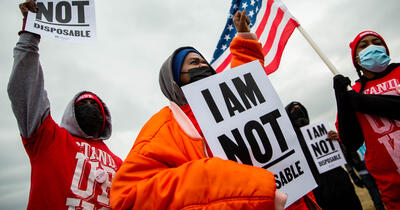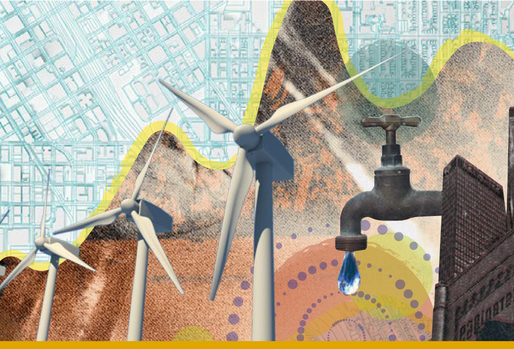
Laying the Foundation for a 22nd-Century Democracy
The inspiring leaders of our 22nd Century Conference panel left me with three big takeaways about the future of our nation.

On my list of Summer 2023 highlights, moderating a panel during the 22nd Century Conference is definitely in the top three. During this year’s conference in Minneapolis, some of the best minds on economic democracy and co-governance met for an engaging conversation about the future of our country. Take Action MN Strategic Partnerships Director Yolanda Roth, New Justice Project MN Executive Director Rod Adams, and Pittsburgh United Executive Director Jennifer Rafanan Kennedy brought a shared passion for creating a democracy that puts people first. It’s impossible to capture every brilliant idea that emerged from the panel, but I’m still thinking about three big takeaways:
1. Black and brown communities’ economic conditions are the product of policy choices.
From slavery to redlining to unchecked predatory lending, deliberately racist policy choices have made it harder for Black and brown people to get ahead in America.
From slavery to redlining to unchecked predatory lending, deliberately racist policy choices have made it harder for Black and brown people to get ahead in America. These choices are inextricably linked to the stark disparities in unemployment and poverty, homelessness, and overall health and wellness. In tandem with our country’s history of white supremacy, policies prioritizing a concentration of private wealth continue to affect Black and brown communities.
What makes matters worse is that these policies didn’t just have an economic effect. Understandably, they have also fueled distrust of government and disengagement from the political process among some of the hardest-hit communities. To break through this layer of powerlessness, we need a new paradigm.
2. Economic liberation for Black and brown people requires a new set of policy choices—and a new lens through which we see the world.
For most of American history, being a wealthy white man has been a prerequisite for access to power. While that’s changed somewhat over the years, the reality still is that a small group of people make decisions that have a significant impact on the rest of us. What if we could change that?
Economic democracy and people-centered governance are ways to bring more people to the table to decide how to use land, labor, and capital to serve the public good. Instead of focusing on building wealth for a handful of people, these philosophies focus on building communities that work for all of us. These concepts can’t just be on the periphery of our approach to democracy; they must be at the foundation.
3. Politicians and policy wonks don’t have all the answers. If we want lasting change, we need to listen to everyday people.
Rod said it best: “The leaders of the movement are folks … who are struggling to pay their rent, who are working three jobs and haven’t seen their kid in two days. When we talk about who the leaders of the movement are, we need to look to them.”
Politicians, academics, and policy experts can discuss the importance of quality water infrastructure. Still, people in cities like Flint and Pittsburgh understand why we need to think of water as a public good. Black and brown Texans whose government failed them after Hurricane Harvey know first-hand how vital co-governance is in flood recovery. Virginians who have seen the negative effect of Amazon taking over other communities—including rent increases that left Black, brown, and low-income people displaced—organize because they love their neighbors too much to see them suffer a similar fate. And while Wall Street continues to be a bastion of corporate greed, everyday New Yorkers are working to disrupt the status quo and establish a new system of banking accountable to the people.
These are just a few of countless examples of communities coming together to fight back in the face of systems that have disenfranchised too many of us for far too long. They know that creating and maintaining a people-centered democracy means establishing a culture where people can build civic power every day.
At its core, economic democracy acknowledges the humanity of Black and brown communities.
We do not suggest voting or attending a city council meeting isn’t worthwhile. But democracy is more significant than that. At its core, economic democracy acknowledges the humanity of Black and brown communities. It is an unyielding commitment to basic needs like clean water, clean air, and affordable housing for all and a refusal to accept the corporate greed and top-down governance that have compromised access to those needs. When we start there—with a fundamental understanding that communities’ humanity, not corporate profit, is the priority—we can change the world.


